The Mill City Times Interview: Doug Snyder, Executive Director, Mississippi Watershed Management Organization
 Sunday, January 17, 2021 at 12:36PM |
Sunday, January 17, 2021 at 12:36PM |  Becky Fillinger |
Becky Fillinger | Article by Becky Fillinger
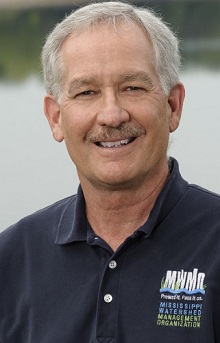 Doug SnyderThere are three dozen watershed organizations in the Twin Cities metropolitan area. Most of our Mill City Times readers live in the geography covered by the Mississippi Watershed Management Organization (MWMO). We spoke to Doug Snyder, Executive Director of the Mississippi Watershed Management Organization about ways to get involved to protect our rivers and drinking water, their Sustainable Communities partnership with the University of St. Thomas, and seeing projects to fruition.
Doug SnyderThere are three dozen watershed organizations in the Twin Cities metropolitan area. Most of our Mill City Times readers live in the geography covered by the Mississippi Watershed Management Organization (MWMO). We spoke to Doug Snyder, Executive Director of the Mississippi Watershed Management Organization about ways to get involved to protect our rivers and drinking water, their Sustainable Communities partnership with the University of St. Thomas, and seeing projects to fruition.
Q: We recently spoke to one of the MWMO Water Stewards, Michelle Spangler. Please tell us more about the program and how citizens may become Stewards.
A: The MWMO has been partnering with Freshwater since 2016 to train and support Minnesota Water Stewards (formerly known as Master Water Stewards). The Minnesota Water Stewards program trains, certifies and supports community leaders to prevent water pollution and educate community members about conserving and protecting water. Stewards perform many hours of service in the watershed each year, doing a variety of things, including: leading or participating in community cleanups, invasive species removal, maintaining raingardens, and conducting community outreach to educate community members about ways to protect water quality and habitat.
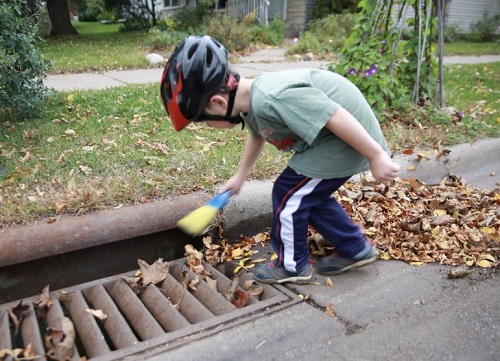 As a Water Steward, Michelle got a grant from the MWMO to organize and support the NE Stormdrain Challenge in the summer of 2020. She partnered with the Audubon Neighborhood Association and the City of Minneapolis to educate, engage and motivate residents all over northeast Minneapolis to take responsibility for keeping their stormdrains clean and keep many pounds of pollution out of the Mississippi River.
As a Water Steward, Michelle got a grant from the MWMO to organize and support the NE Stormdrain Challenge in the summer of 2020. She partnered with the Audubon Neighborhood Association and the City of Minneapolis to educate, engage and motivate residents all over northeast Minneapolis to take responsibility for keeping their stormdrains clean and keep many pounds of pollution out of the Mississippi River.
More information about the Minnesota Water Steward program is available on our website or at minnesotawaterstewards.org.
I want to mention that applications for our Community Grants are available now – see information here to apply. Community Grants are available for short-term or small-scale water quality projects. The grant amount may not exceed $5,000, no matching funds are required, and we can offer help for those completing the application.
Q: We typically think of watershed projects during warmer months. How do MWMO projects continue during winter months?
A: Yes, some types of work can continue over the winter, such as installation of pipes and underground tanks; however, most of the types of work on the surface need to be installed during the growing season. Therefore, most of our capital projects are scheduled from around April 1 until the ground freezes or there is too much snow. One project that has taken advantage of the good late fall/early winter weather this year is the Northern Columbia Golf Course and Park Stormwater BMPs project. You can follow this project online at mwmo.org/columbia.
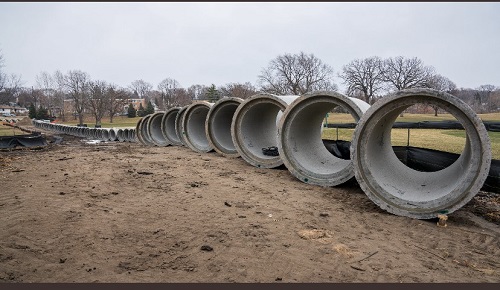 Columbia Golf Course drains
Columbia Golf Course drains
And, of course, we do public information seminars throughout the year. Coming up, we have a free workshop on managing ice and snow without over applying salt –register here.
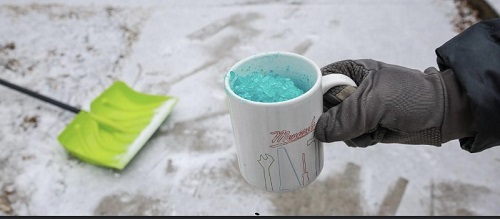
Q: Is MWMO part of Minnesota Association of Watershed Districts? If so, how do you work collaboratively with other watershed districts?
A: Yes, we are a member. Two years ago, the Minnesota Association of Watershed Districts (MAWD) opened its membership to other Watershed Management Organizations. We joined in 2019. Even prior to joining MAWD, MWMO partnered with other watersheds (and our members, nonprofits and state agencies) to create training opportunities, public engagement events, and coordinate planning and project review.
Q: You have a large list of active projects - one that jumped out to me with the UST Sustainable Communities Partnership project. Can you tell us more about it?
A: Yes, the Sustainable Communities Partnership Project is run through the Sustainability office at the University of St. Thomas (UST) and it partners UST courses with government and nonprofit organizations to do projects that support and advance sustainability-oriented work in those organizations. Over the last few years, several UST courses have supported the work of the MWMO by doing projects that help increase staff understanding of various issues related to watershed protection and management. A few examples of recent projects include:
• A senior capstone class that researched possible industrial uses for captured stormwater and considered cost-effectiveness and ecological impacts of stormwater reuse systems in the urban environment.
• Evaluation of the effectiveness of various graphics related to stormwater best management practices in order to recommend most effective graphics and appropriate use.
• Research and analysis of different land-use scenarios for the conversion of vacant lots in the MWMO to better understand opportunities to manage stormwater runoff and connect pollinator habitat across the watershed.
This program gives students real-life experiences in sustainability work and benefits the partner organizations by increasing capacity to conduct research and complete projects that advance the work of the organization. We have enjoyed and benefited from this partnership. More information about our partnership is available on the UST website: https://www.stthomas.edu/osi/scpprojects/completed-scp-projects/mwmo/
Q: What do you enjoy the most about your work with the MWMO?
A: Prior to coming to the MWMO, I worked for the Minnesota Board of Water and Soil Resources. There I worked with grants, planning and regulatory programs such as the Wetland Conservation Act. While we do similar things here, what I enjoy most is that we also get to create programming and build projects. We go through feasibility, design, financing, bid, construction, and operations and maintenance. It’s fun to see a completed project, monitor it, and know we’ve done something that improves where we live.
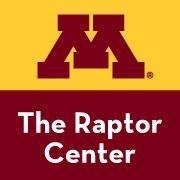 Q: How may we follow your news?
Q: How may we follow your news?
A: Please sign up for our newsletter, and follow us on social media: Facebook, Instagram and YouTube.
